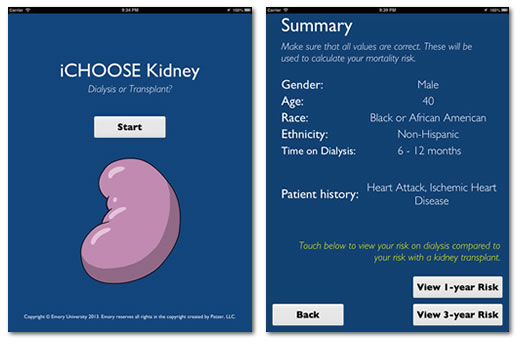26 million Americans have chronic kidney disease and millions of others are at increased risk, according to the National Kidney Foundation's website.
Patients suffering from kidney disease are presented with two main treatment options: dialysis and kidney transplant. Medical studies have shown that receiving a kidney transplant yields a better quality of life and chance of survival than going on dialysis. While it is required by law for clinicians or physicians to discuss kidney transplant as a treatment option with their patients, Emory epidemiologist Rachel Patzer, PhD, MPH, assistant professor in surgery, says that many eligible patients are not being referred for kidney transplantation. Through her research, Patzer found that such disparities were often present in regions outside the Atlanta area.

Rachel Patzer
"There are disparities in who is getting access to that information about transplant, which I think is leading to some of the disparities we see in access to getting on the waiting list and receiving a transplant," Patzer says. While Patzer says the optimal treatment for kidney disease is transplant, she says this depends on patients' individualized risk profile, which includes factors such as their age and other possible medical conditions they may have.
To address treatment disparities and help patients understand the best treatment option for their individual cases, Patzer and her team created the iCHOOSE Kidney iPad application. The iCHOOSE Kidney app is a shared-decision making tool for providers or clinicians to use with their patients to inform them about potential risks and benefits of each treatment. "The app basically walks you through different risks for treatment options," Patzer says.
Upon a patient's initial diagnosis of end-stage kidney disease, physicians or clinicians can enter in patient data into the iCHOOSE Kidney app, which in turn calculates the risks of dying on dialysis versus a kidney transplant. The app calculates both relative and absolute risks based on data from a national database of almost 700,000 patients.
The app tries to keep things simple for patients by presenting data in a picture format. Patzer says illustrating information visually is one of the best ways to convey risks to patients. "Showing patients you’re going to live this many years longer or that this is 10 times better is really more powerful than just giving them the average," Patzer says.
Panya Taysavang, licensing associate in the Office of Technology Transfer states "the iChoose Kidney app presents detailed information in a visual format that is easy to understand and ultimately benefits patients by providing a tool for informed decision making in choosing between dialysis or kidney transplantation."
The app is already being used at Emory University and in the surrounding community. Patzer says that some of the Emory transplant surgeons and nephrologists at Emory have used the iCHOOSE Kidney app as part of their communication with patients. In addition to the iPad app, there's an online version at ichoosekidney.emory.edu. Patzer says that an iCHOOSE Kidney iPhone app is in the works.

